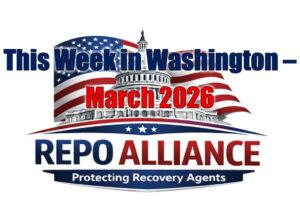Frees Forwarders from Collections Licensing but may open Hunstein-like issues for LPR and RDN, etc.
EDITORIAL
On August 17th, 2021, Michigan state Representatives Gregory Markkanen[R]and Sara Cambensy [D], introduced HB5256, a bill written to draft new definitions of what is to be considered a “Collection Agency” and what is not. In the proposal, it omits repossession forwarders from being deemed collection agencies, but like the 11TH Circuit Hunstein v. Preferred Collection and Management Services decision, could possibly opened the door to other repossession vendors being brought under its licensing requirements with threat of possible litigation.
Another thought on this bill, is that with its removal of forwarding companies from the requirements of being deemed a collection agency, it could be an attempt to extinguish the grounds of George Badeen’s more than ten-year lawsuit against PAR. This epic legal battle was coincidentally remanded back to Michigan after another failed appeal in the US Supreme Court. This case is expected to be heard next month and may be their last appeal. At stake are approximately $270M in damages that PAR, like most forwarders in this low repossession volume, low fee environment, would have trouble absorbing.
Labeled as a bill to amend 1980 PA 299, entitled “Occupational code,” they lay wide open the opportunity for broad definitions and interpretations that could be applied to any platform that is relied upon to convey the legitimacy of a repossession. The below statements are noticeably troublesome in that
“Collection agency also includes a person that uses a fictitious name or the name of another person in the collection or repossession of claims to convey to the debtor that a third person is collecting or repossessing or has been employed to collect or repossess the claim.”
Please correct me if I’m wrong, but if by showing a borrower evidence of a right and authority to repossess in the name of a lender is shown to a borrower this authority by any means transmitted through RDN, MBSi or any of the LPR providers in a third-party custody claim, could that not place the vendor under these definitions?
“Collection agency also includes a person that furnishes or attempts to furnish a form or a written demand service represented to be a collection or repossession technique, device, or system to be used to collect or repossess claims, if the form contains the name of a person other than the creditor in a manner that indicates that a request or demand for payment is being made by a person other than the creditor even though the form directs the debtor to make payment directly to the creditor rather than to the other person whose name appears on the form.”
That’s about as clear as mud to my layman ears. “Form or written demand service represented to be a collection or repossession technique, device, or system to be used to collect or repossess claims” for starters. Couldn’t all repossession assignment platforms be then defined as devices or systems used to repossess claims?
Conveniently carved out for exemption for licensing are the forwarding companies.
Collection agency does not include a person whose collection activities are confined and are directly related to the operation of a business other than that of a collection agency such as, but not limited to, the following:
(xii) A forwarding agency that, acting on behalf of a creditor or lender, forwards a claim, collection, or repossession only to a licensed collection agency that is licensed under this article or to a person whose collection activities are excluded or exempted from licensing under this article.
I am not a lawyer and this is not legal advice. This is merely my personal thoughts as I see them. Any considerations as to the applicability or non-applicability of this bill should be taken under legal consideration.
Kevin Armstrong
New Michigan Repossession Bill Favors Forwarders – New Michigan Repossession Bill Favors Forwarders – New Michigan Repossession Bill Favors Forwarders











More Stories
ATR Driver Critically Injured in Semi Collision – Needs Help!
Tragedy Strikes Benchmark Recovery Family – Help Needed!
Gun to the Head: Conviction in the Slidell Repossession Nightmare
Undercover ATF Pose as Repo Men to Take Down Illegal Gun Dealers
Gun Drawn on Friday the 13th Repo
National Dealer Association Responds to Senate Repossession Probe